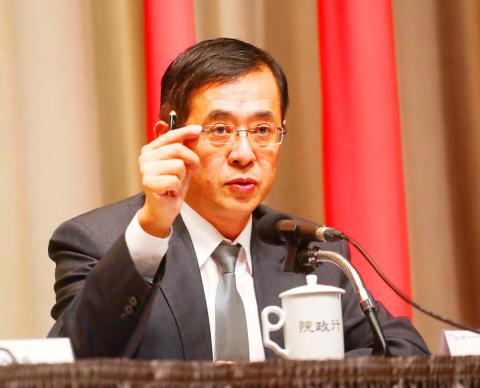The Executive Yuan yesterday approved draft legislation that would close private universities that fail to enroll enough students, with the Ministry of Education scheduled to announce enrollment figures and the financial status of all universities next month to alert students and academics to possible closures.
Under the bill, universities that have less than 3,000 students, fail to achieve at least 60 percent of their enrollment goal for two consecutive years, fail to pay faculty salaries for three months in a row or exhibit signs of financial instability would be placed on a watch list; they would be closed in three years should they fail to make improvements, Deputy Minister of Education Yao Leeh-ter (姚立德) said.
The bill was proposed to reduce the number of universities given the nation’s low birth rate.

Photo: CNA
New college students last year totaled 255,000, a decrease of 15,000 from 2015, ministry data showed.
The number is predicted to drastically diminish to about 156,000 in 2028, suggesting huge enrollment difficulties for universities.
While the ministry cannot announce which universities will face closure until the Legislative Yuan approves the bill, it will for announce enrollment figures and the financial status and faculty numbers of universities nationwide for the first time, Yao said.
The figures and statistics are to be updated annually, he added.
Schools facing closure could be transformed into other educational, cultural or welfare institutions, or they could be liquidated, the ministry said, adding that when a university begins liquidation, faculty would have priority to receive payments to protect salaries, severance pay and pensions.
Any surplus funds following the liquidation would be diverted to local governments or a ministry fund to phase out substandard universities, it said.
The restriction on surplus funds aims to prevent a university’s management from appropriating school assets or selling off school properties, it added.
“While some universities might use the transition as an excuse to avoid liquidation without actually fulfilling the functions of an alternative educational, cultural or welfare institution, the draft legislation authorizes relevant government authorities to impose forced liquidation,” Yao said.
To protect the rights of students and faculty, the ministry fund would be used to relocate students and provide loans to financially troubled universities to pay teachers’ salaries and pensions, he said.
The fund has been allocated NT$2.5 billion (US$83.3 million), which is to be expanded to NT$5 billion in three years through the ministry’s budget, he added.
As the expected drop in the number of students would also pose a severe problem for public universities, the ministry plans to reduce the enrollment quota of departments that fail to reach 80 percent of their enrollment goal, Yao said.

SECURITY: As China is ‘reshaping’ Hong Kong’s population, Taiwan must raise the eligibility threshold for applications from Hong Kongers, Chiu Chui-cheng said When Hong Kong and Macau citizens apply for residency in Taiwan, it would be under a new category that includes a “national security observation period,” Mainland Affairs Council (MAC) Minister Chiu Chui-cheng (邱垂正) said yesterday. President William Lai (賴清德) on March 13 announced 17 strategies to counter China’s aggression toward Taiwan, including incorporating national security considerations into the review process for residency applications from Hong Kong and Macau citizens. The situation in Hong Kong is constantly changing, Chiu said to media yesterday on the sidelines of the Taipei Technology Run hosted by the Taipei Neihu Technology Park Development Association. With

CARROT AND STICK: While unrelenting in its military threats, China attracted nearly 40,000 Taiwanese to over 400 business events last year Nearly 40,000 Taiwanese last year joined industry events in China, such as conferences and trade fairs, supported by the Chinese government, a study showed yesterday, as Beijing ramps up a charm offensive toward Taipei alongside military pressure. China has long taken a carrot-and-stick approach to Taiwan, threatening it with the prospect of military action while reaching out to those it believes are amenable to Beijing’s point of view. Taiwanese security officials are wary of what they see as Beijing’s influence campaigns to sway public opinion after Taipei and Beijing gradually resumed travel links halted by the COVID-19 pandemic, but the scale of

A US Marine Corps regiment equipped with Naval Strike Missiles (NSM) is set to participate in the upcoming Balikatan 25 exercise in the Luzon Strait, marking the system’s first-ever deployment in the Philippines. US and Philippine officials have separately confirmed that the Navy Marine Expeditionary Ship Interdiction System (NMESIS) — the mobile launch platform for the Naval Strike Missile — would take part in the joint exercise. The missiles are being deployed to “a strategic first island chain chokepoint” in the waters between Taiwan proper and the Philippines, US-based Naval News reported. “The Luzon Strait and Bashi Channel represent a critical access

Pope Francis is be laid to rest on Saturday after lying in state for three days in St Peter’s Basilica, where the faithful are expected to flock to pay their respects to history’s first Latin American pontiff. The cardinals met yesterday in the Vatican’s synod hall to chart the next steps before a conclave begins to choose Francis’ successor, as condolences poured in from around the world. According to current norms, the conclave must begin between May 5 and 10. The cardinals set the funeral for Saturday at 10am in St Peter’s Square, to be celebrated by the dean of the College